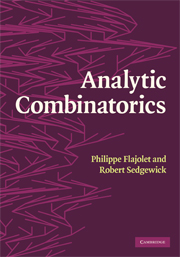Book contents
Appendix A - AUXILIARY ELEMENTARY NOTIONS
from Part D - APPENDICES
Published online by Cambridge University Press: 11 April 2011
Summary
We combine in the three appendices definitions and theorems related to key mathematical concepts not covered directly in the text. Generally, the entries in the appendices are independent, intended for reference while addressing the main text. Our own Introduction to the Analysis of Algorithms [538] is a gentle introduction to many of the concepts underlying analytic combinatorics at a level accessible to any college student and is reasonable preparation for undergraduates or anyone undertaking to read this book for self-study.
This appendix contains entries that are arranged in alphabetical order, regarding the following topics:
Arithmetical functions; Asymptotic notations; Combinatorial probability; Cycle construction; Formal power series; Lagrange inversion; Regular languages; Stirling numbers; Tree concepts.
The corresponding notions and results are used throughout the book, and especially in Part A relative to Symbolic Methods. Accessible introductions to the subject of this appendix are the books by Graham–Knuth–Patashnik [307], and Wilf [608], regarding combinatorial enumeration, and De Bruijn's vivid booklet [142], regarding asymptotic analysis. Reference works in combinatorial analysis are the books by Comtet [129], Goulden–Jackson [303], and Stanley [552, 554].
Arithmetical functions
A general reference for this section is Apostol's book [16]. First, the Euler totient function ϕ(k) intervenes in the unlabelled cycle construction (pp. 27, 84, 165, as well as 729 below). It is defined as the number of integers in [1 ‥ k] that are relatively prime to k.
Information
- Type
- Chapter
- Information
- Analytic Combinatorics , pp. 721 - 738Publisher: Cambridge University PressPrint publication year: 2009
